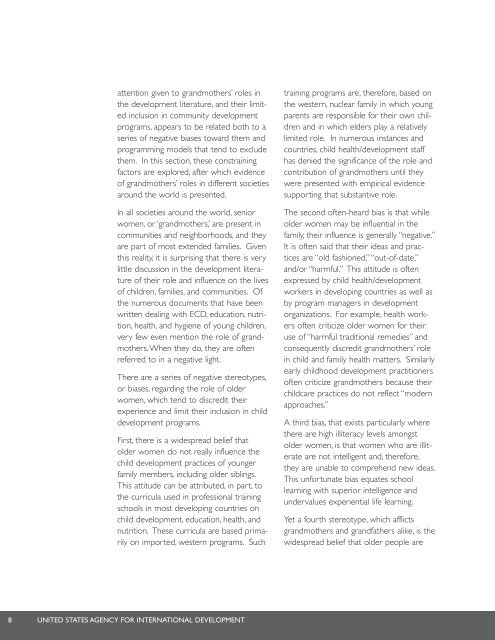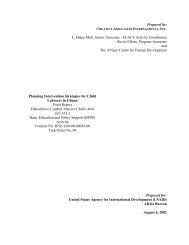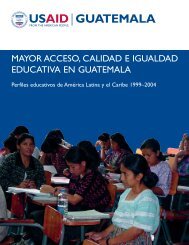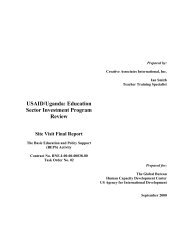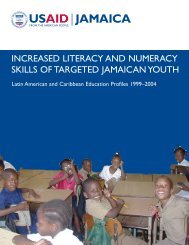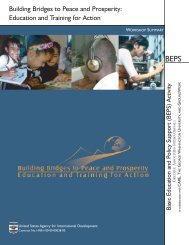attention given to gr<strong>and</strong>mothers’ roles inthe development literature, <strong>and</strong> their limitedinclusion in community developmentprograms, appears to be related both to aseries of negative biases toward them <strong>and</strong>programming models that tend to excludethem. In this section, these constrainingfactors are explored, after which evidenceof gr<strong>and</strong>mothers’ roles in different societiesaround the world is presented.In all societies around the world, seniorwomen, or ‘gr<strong>and</strong>mothers,’ are present incommunities <strong>and</strong> neighborhoods, <strong>and</strong> theyare part of most extended families. Giventhis reality, it is surprising that there is verylittle discussion in the development literatureof their role <strong>and</strong> influence on the livesof children, families, <strong>and</strong> communities. Ofthe numerous documents that have beenwritten dealing with ECD, education, nutrition,health, <strong>and</strong> hygiene of young children,very few even mention the role of gr<strong>and</strong>mothers.When they do, they are oftenreferred to in a negative light.There are a series of negative stereotypes,or biases, regarding the role of olderwomen, which tend to discredit theirexperience <strong>and</strong> limit their inclusion in childdevelopment programs.First, there is a widespread belief thatolder women do not really influence thechild development practices of youngerfamily members, including older siblings.This attitude can be attributed, in part, tothe curricula used in professional trainingschools in most developing countries onchild development, education, health, <strong>and</strong>nutrition. These curricula are based primarilyon imported, western programs. Suchtraining programs are, therefore, based onthe western, nuclear family in which youngparents are responsible for their own children<strong>and</strong> in which elders play a relativelylimited role. In numerous instances <strong>and</strong>countries, child health/development staffhas denied the significance of the role <strong>and</strong>contribution of gr<strong>and</strong>mothers until theywere presented with empirical evidencesupporting that substantive role.The second often-heard bias is that whileolder women may be influential in thefamily, their influence is generally “negative.”It is often said that their ideas <strong>and</strong> practicesare “old fashioned,” “out-of-date,”<strong>and</strong>/or “harmful.” This attitude is oftenexpressed by child health/developmentworkers in developing countries as well asby program managers in developmentorganizations. For example, health workersoften criticize older women for theiruse of “harmful traditional remedies” <strong>and</strong>consequently discredit gr<strong>and</strong>mothers’ rolein child <strong>and</strong> family health matters. Similarlyearly childhood development practitionersoften criticize gr<strong>and</strong>mothers because theirchildcare practices do not reflect “modernapproaches.”A third bias, that exists particularly wherethere are high illiteracy levels amongstolder women, is that women who are illiterateare not intelligent <strong>and</strong>, therefore,they are unable to comprehend new ideas.This unfortunate bias equates schoollearning with superior intelligence <strong>and</strong>undervalues experiential life learning.Yet a fourth stereotype, which afflictsgr<strong>and</strong>mothers <strong>and</strong> gr<strong>and</strong>fathers alike, is thewidespread belief that older people are8 UNITED STATES AGENCY FOR INTERNATIONAL DEVELOPMENT
incapable either of learning new things orchanging their ways due to their age. Theessence of the saying in English about olddogs not being able to learn new tricksexists in many cultures. For example, inLaos it is frequently said that “you cannotbend an old piece of bamboo.” Based onthe belief that gr<strong>and</strong>mothers are by natureresistant to change, many developmentpractitioners assume that gr<strong>and</strong>mothersare both unwilling <strong>and</strong> unable to assimilatenew child development knowledge <strong>and</strong>practices.The last factor is the restricted perceptionof older women as being “needy” <strong>and</strong>“dependent” that ignores the many gr<strong>and</strong>motherswho are active <strong>and</strong> resourcefulmembers of households <strong>and</strong> communities.In developing countries where mostwomen marry <strong>and</strong> have their first child bythe time they are twenty, most womenbecome gr<strong>and</strong>mothers at an early age <strong>and</strong>remain active in this role until they are atleast sixty or older. In this sense, the perceptionof gr<strong>and</strong>mothers as generallydecrepit <strong>and</strong> dependent is inaccurate.All of these stereotypes are reinforced byattitudes of ageism, which gerontologistsdefine as the “unwarranted application ofnegative stereotypes to older people”(Fennell et al l988, 97). Ageist attitudes areembedded in western, youth-focused cultures,<strong>and</strong> they appear to influence thethinking of many western-oriented developmentagencies, their policies <strong>and</strong> programs.The combination of these several stereotypesseem to explain the rather negativeattitude in development programs towardgr<strong>and</strong>mothers’ roles <strong>and</strong> experience <strong>and</strong>toward their potential to promote optimalchild development in households <strong>and</strong> communities.While these biases against gr<strong>and</strong>mothersappear to be quite widespread,they can be overcome. In several of thechild development programs (discussedlater) in which an explicit effort was madeto help development staff reexamine theirattitudes toward these senior women, verypositive changes have been observed intheir perceptions of <strong>and</strong> attitudes towardgr<strong>and</strong>mothers.A second factor that works against theinclusion of gr<strong>and</strong>mothers in child developmentprograms comes from the restrictivemodels, or frameworks, typically used bothto assess children’s developmental needs<strong>and</strong> to design program strategies. Asintroduced in the conceptual frameworkused for this review, in most cases,whether programs address ECD, nutrition,health, cognitive development, or otherissues, there is a tendency to assess children’sneeds only at the level of the childor the child-mother dyad. Most programsare not based on a holistic analysis of theinterface between children <strong>and</strong> householdactors, resources, values, <strong>and</strong> interactionrelated to a child’s development.The predominant concepts <strong>and</strong> modelsthat underpin most programs promotingECD, health, nutrition, <strong>and</strong> other developmentissues are rooted in North Americanconcepts from behavioral psychology. Thisis a field that focuses on individuals isolatedfrom their social environment. The moresystemic perspectives on the growth <strong>and</strong>development of children—from ecology,anthropology, community psychology, <strong>and</strong>GRANDMOTHERS:THE LEARNING INSTITUTION9
- Page 1 and 2: GRANDMOTHERS:A LEARNING INSTITUTION
- Page 3: GRANDMOTHERS:A LEARNING INSTITUTION
- Page 11 and 12: EXECUTIVE SUMMARYSociety itself fai
- Page 13 and 14: Education, the Bernard Van LeerFoun
- Page 15 and 16: SEVERAL FACTORS CONTRIBUTE TO THELI
- Page 17: - Who am I? Assign children to askf
- Page 20 and 21: in educational activities on home t
- Page 22 and 23: “A grandmother’s understandingo
- Page 24 and 25: “Culture tells peoplehow to view
- Page 28 and 29: social work, including family syste
- Page 30 and 31: mation from Azerbaijan (McNulty 200
- Page 32 and 33: “The status of eldersin tradition
- Page 34 and 35: “As women, thegrandmothers haveli
- Page 36 and 37: members often consult the moreexper
- Page 38 and 39: “Social capital is a community’
- Page 40 and 41: In a collaborative effort between
- Page 42 and 43: in-laws and the additional free tim
- Page 44 and 45: "Involving grandmothersin community
- Page 50 and 51: CULTURALLY-ADAPTED EDUCATIONMATERIA
- Page 52 and 53: strated the power of participatory
- Page 54 and 55: effects of the new ideas, their con
- Page 57 and 58: V. GRANDMOTHERS: A LEARNING INSTITU
- Page 59 and 60: Many health and development workers
- Page 61 and 62: VI. RECOMMENDATIONS FORBASIC EDUCAT
- Page 63 and 64: parents themselves did not go to sc
- Page 65 and 66: community ties by increasing teache
- Page 67 and 68: of millions. On the other hand, som
- Page 69: teachers, teacher abuse of children
- Page 73 and 74: APPENDIX B:ANNOTATEDREFERENCES ON T
- Page 75 and 76: acceptable for younger women to mak
- Page 77 and 78:
showed that men are not directly in
- Page 79 and 80:
ecause they had more time to devote
- Page 81 and 82:
matrilineal or patrilineal areas
- Page 83 and 84:
diet, work, fetal development, sexu
- Page 85 and 86:
in the family and social networks.
- Page 87 and 88:
elated, for example, to early child
- Page 89 and 90:
REFERENCESAdams, A. M., S. Madhavan
- Page 91 and 92:
BASICS and LINKAGES. 1998. Influenc
- Page 93 and 94:
Childhood Education and Development
- Page 95 and 96:
Krishna, A. and N. Uphoff. June 199
- Page 97 and 98:
Sear, R., R. Mace, and I. A. McGreg
- Page 99 and 100:
ABOUT THE AUTHORThis review was pre


